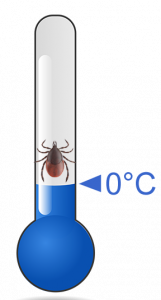Ticks are Gross
Ticks are creepy little bugs that hide in long grass waiting to jump on any creature (furry or human) that passes by.
Once on board, they bury their head in their host (your pet! or you…) and suck blood. While sucking blood they can increase in size by ten times or more (this is really gross), and also transmit diseases to their host.
Why Do Ticks Matter?
Ticks carry and transmit many diseases. In Ontario, ticks carry Lyme disease – a disease that can range from mild to severe and causes a whole host of health problems. Ticks in other regions can carry many more diseases, especially in places with a milder winter (in other words, you don’t want to run into a tick in Texas!). This is also important to think about if you are traveling with your furry companion.
Unfortunately, ticks are becoming much more common in Ontario, including Brampton. We’ve seen a big increase in the number of ticks – and Lyme disease positive dogs – in the last 2 years.
Time’s a Ticking
Ask: Is It 0 Degrees?
“Tick time is anytime the temperature is above freezing (0°C)”
Ticks aren’t killed by winter’s cold, but simply go dormant where ever they happen to be. As soon as the temperature warms up above freezing (0 degrees Celsius), they “wake up” and start looking for a meal. This does not simply mean that ticks start to “wake up” at 0°C, it means that when the temperature hits 0°C ticks are actively seeking food (blood!).
For example, even if the temperature climbs above freezing for only an hour in January (even if snow is still on the ground!), for that hour, ticks are fully active and looking latch on to an unsuspecting passerby.
Ticks are always active whenever it’s above freezing – all year ’round, but they are especially active in the fall and spring as the temperatures are changing between summer and winter.
Spring Ahead
Ticks love the spring – once temperatures creep into the 0°C+ range, ticks are looking for a 4-legged snack. Combining tick prevention with your annual flea and heartworm prevention is a great way to keep your pet healthy and avoid the wrong kind of “spring fever”!
Fall is Tick Season Too!
When temperatures start to drop again in fall, ticks become more active and look for a tasty sip of Bowser’s blood. Ticks love any temperature down to freezing, so we recommend keeping up your guard until the snow is flying.
Winter!
Yes, winter. In the last few years, there have been several days every month of the year with temperatures above freezing. On these days, your dog is at risk.
Along with milder winters, we are seeing the Lyme disease carrying black-legged tick moving towards us from the Kingston area. There is already Lyme disease in Peel region, and in the next few years, it will become much more common as these ticks make their home here.
The bottom line is that if it’s above freezing, both you and your pet should be protected from ticks, no matter what month of the year!
What Can You Do?
Over the last few years, the number of veterinary tick prevention products have expanded – we now have a lot of great choices that protect your pet from ticks, including stopping the transmission of Lyme disease.
Do a Tick Check!
After every walk, do a tick check. Ticks only transmit 24-48 hours after biting, so finding them early is important!
Learn how to do a tick check on your dog from the University of Manitoba:
Prevention All Year Long
Because of the increased Lyme disease risk, we are now recommending tick protection for a full 12 months of the year. Heartworm medications (including those with tick protection) are only prescribed until November – this leaves your pet unprotected from December until the spring.
To protect your pet from ticks through the winter, please contact us for simple-to-use tick prevention medication. And don’t worry: If your pet is up-to-date with their annual examination, you won’t even need to bring them in!
Lyme Disease Vaccination
The third prong in the three-prong approach to tick prevention. If your dog is travelling to an area with a high risk of Lyme disease (for instance, the Ottawa valley), Lyme disease vaccination can provide an extra layer of protection for your dog.
Let us Help!
Now is a great time to come in and discuss the best protection for your furry family member – please book an appointment and we’ll see you soon!
Additional Information
- Pet Health Network Canine Parasites infographic: Includes great info on ticks and Lyme disease
- Our clinic: Call or visit us for more information

